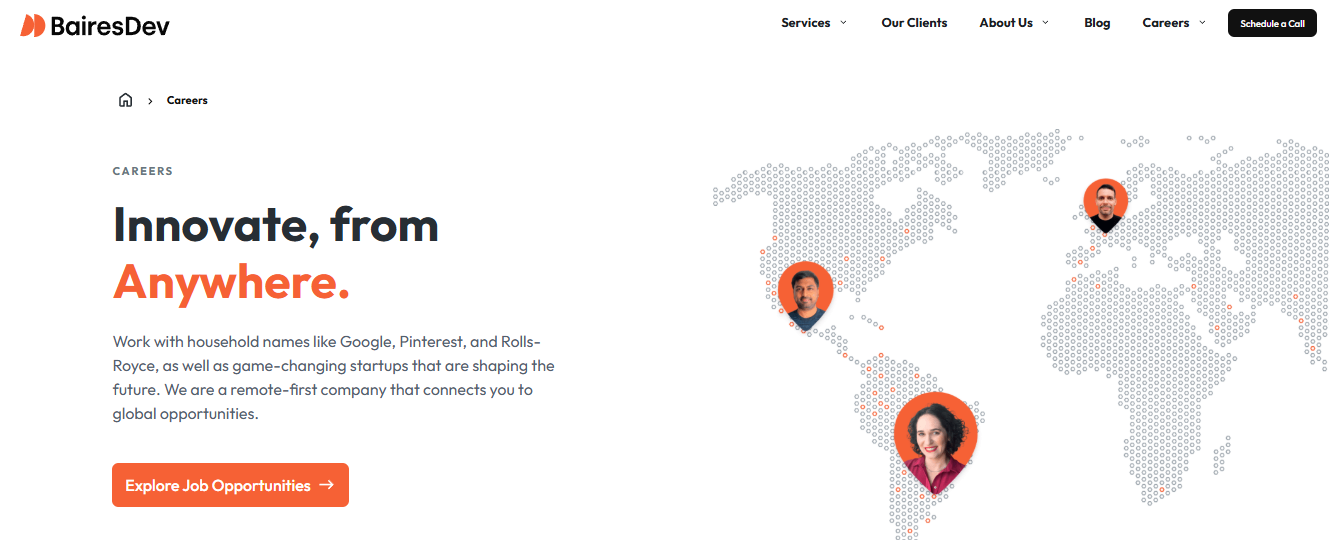Choosing the Right Software Development Company: A Guide for Businesses
What to Look for in a Software Development Company
Selecting the right software development company can make or break the success of your project. With numerous options available, understanding what to prioritize during your search is essential. Here is a comprehensive guide to the key aspects to consider when evaluating potential partners:
1. Expertise and Technical Skills
- Technology Stack: Ensure the company specializes in the technologies relevant to your project. Whether you need expertise in Java, Python, or emerging technologies like AI and blockchain, their skills should align with your needs.
- Industry Experience: Look for a company with a proven track record in your industry. Experience in specific domains ensures they understand the unique challenges and requirements of your business.
2. Portfolio and Case Studies
- Review their previous work to assess the quality and scope of their projects. Pay close attention to projects similar to yours, as this demonstrates their ability to deliver tailored solutions.
- Case studies often highlight the problems solved, technologies used, and results achieved, providing insight into their approach.
3. Reputation and Reviews
- Client Testimonials: Read reviews and testimonials on their website, third-party platforms, and social media to gauge their reputation.
- References: Request references from past clients to get first-hand feedback on their performance, communication, and problem-solving capabilities.
4. Communication and Collaboration
- Clear and consistent communication is vital for project success. The company should be transparent, responsive, and able to adapt to your preferred communication style.
- Evaluate their collaboration tools and processes. Tools like Jira, Slack, and Trello can streamline workflows and ensure alignment between teams.
5. Development Methodology
- Agile Approach: Companies using Agile methodologies tend to deliver projects faster and with more flexibility. Agile practices ensure continuous feedback and iteration, reducing the risk of misalignment.
- Waterfall Model: For projects with clearly defined requirements, a Waterfall approach may be suitable. Choose a company that matches your preferred methodology.
6. Cost and Value
- Assess their pricing model—whether it’s fixed price, time and material, or dedicated team—to find one that fits your budget and project scope.
- The cheapest option isn’t always the best. Focus on value for money, considering factors like expertise, quality, and delivery timelines.
7. Scalability and Long-term Support
- Ensure the company can scale its resources to accommodate your growing needs.
- Check if they offer post-launch support, maintenance, and updates to keep your software running smoothly over time.
8. Cultural Fit
- A strong cultural alignment fosters better collaboration. Look for shared values, work ethics, and an understanding of your business goals.
9. Security Practices
- Verify their approach to data security and intellectual property protection. Ensure they comply with relevant standards, such as GDPR, ISO certifications, or industry-specific regulations.
10. Innovative Thinking
- Companies that stay ahead of trends and invest in research and development can bring innovative solutions to your project. Their ability to propose creative ideas and solve complex problems is a valuable asset.
Choosing the right software development company involves thorough research and a clear understanding of your project’s requirements. By focusing on expertise, reputation, communication, cost, and scalability, you can find a partner capable of delivering high-quality software tailored to your needs. Remember, a well-chosen development partner isn’t just a service provider but a long-term ally in achieving your business objectives.
Key Benefits of Hiring a Professional Software Development Team
In today’s competitive and technology-driven landscape, hiring a professional software development team is crucial for businesses aiming to deliver high-quality digital solutions. A skilled team brings technical expertise, innovative approaches, and efficiency to the table, ensuring that your project is completed successfully. Here are the key benefits of partnering with a professional software development team:
1. Access to Expertise and Specialized Skills
- Professional development teams are composed of experts in various fields, such as frontend and backend development, UI/UX design, quality assurance, and project management.
- They stay updated with the latest technologies, frameworks, and programming languages, enabling them to tackle complex challenges effectively.
- Their diverse skill set ensures that your project benefits from cutting-edge solutions tailored to your business needs.
2. Cost-Effectiveness
- Hiring a professional team eliminates the need to invest in recruitment, training, and maintaining an in-house development team.
- Development agencies typically work on a project-based or contractual basis, allowing you to pay only for the resources and time required.
- By outsourcing, you avoid overhead costs like office space, equipment, and employee benefits.
3. Faster Time to Market
- With established workflows and proven methodologies, professional teams can expedite the development process.
- Their experience allows them to anticipate potential bottlenecks and resolve issues quickly, keeping the project on track.
- Faster delivery ensures that you can launch your product or service sooner, gaining a competitive edge in the market.
4. High-Quality Deliverables
- Professional teams prioritize quality through rigorous testing, code reviews, and adherence to industry standards.
- Their focus on maintaining best practices ensures the development of reliable, scalable, and maintainable software.
- Quality assurance experts identify and fix bugs before launch, minimizing post-deployment issues.
5. Scalability and Flexibility
- Development teams can scale resources up or down based on your project’s requirements, ensuring optimal utilization of time and budget.
- This flexibility allows you to adapt to changing market conditions or add new features without major disruptions.
6. Focus on Core Business Activities
- Outsourcing development tasks to professionals frees up your internal resources, allowing you to concentrate on core business functions like strategy, marketing, and customer relations.
- With technical aspects handled by experts, you can confidently focus on achieving your business objectives.
7. Improved Risk Management
- Experienced development teams are adept at identifying risks and implementing strategies to mitigate them.
- Their systematic approach to project management ensures that potential setbacks are addressed proactively, reducing the likelihood of costly delays or failures.
8. Long-Term Support and Maintenance
- Many professional teams offer ongoing support and maintenance services post-launch, ensuring that your software remains up-to-date and functional.
- They can provide timely updates, security patches, and enhancements to meet evolving business needs.
9. Access to Innovative Solutions
- Professional developers often bring fresh perspectives and innovative ideas to the table, helping you create unique and competitive solutions.
- Their experience with various industries enables them to suggest creative approaches and implement advanced features that set your product apart.
Hiring a professional software development team is a strategic investment that can significantly impact the success of your project. From access to specialized skills and cost savings to faster delivery and long-term support, their expertise ensures high-quality outcomes that align with your business goals. By partnering with the right team, you can transform your ideas into reality and gain a competitive advantage in today’s dynamic market.
How to Evaluate a Software Development Company for Your Project
Choosing the right software development company is a critical decision that can determine the success or failure of your project. With so many options available, it’s essential to have a systematic approach to evaluate potential partners. This guide outlines the key factors to consider when assessing a software development company for your specific needs.
1. Understand Your Project Requirements
- Before evaluating any company, define the scope, objectives, and technical requirements of your project.
- Identify the skills and expertise needed to accomplish your goals.
- Create a clear list of deliverables, deadlines, and budget constraints to communicate effectively with potential partners.
2. Assess Technical Expertise and Skill Set
- Review the company’s technology stack to ensure it aligns with your project’s needs. For instance, check their experience with frameworks like React, Angular, or programming languages like Java or Python.
- Evaluate their familiarity with industry-specific tools or platforms, such as AI, blockchain, or IoT solutions.
- Inquire about certifications or partnerships with leading tech providers like Microsoft, Google, or AWS.
3. Review Portfolio and Case Studies
- Examine the company’s portfolio to gauge the quality of their previous projects.
- Look for case studies that demonstrate their problem-solving approach, creativity, and ability to deliver results.
- Pay attention to projects similar to yours in complexity, industry, or scale.
4. Check Client Testimonials and References
- Read reviews on platforms like Clutch, GoodFirms, or Google to get insights into their reputation.
- Request references from past clients to understand their experience working with the company.
- Focus on aspects like communication, adherence to deadlines, and overall satisfaction.
5. Evaluate Communication and Collaboration
- Effective communication is crucial for project success. Assess their responsiveness, clarity, and willingness to address your concerns.
- Ensure they have established processes and tools for collaboration, such as Slack, Jira, or Trello.
- Determine whether their working hours and time zone align with yours to avoid delays.
6. Examine Development Methodologies
- Ask about their approach to project management. Agile methodologies, for example, are ideal for iterative and flexible development.
- Ensure they follow best practices for software development, including version control, testing, and documentation.
- Understand how they handle changes in requirements and unexpected challenges during the project.
7. Assess Security and Compliance
- Verify their adherence to security protocols and data protection standards like GDPR or ISO certifications.
- Ask about measures they take to ensure the confidentiality and integrity of your project data.
- Ensure they have a robust process for handling intellectual property rights and contracts.
8. Evaluate Cost and Pricing Model
- Understand their pricing structure, whether it’s a fixed price, hourly rate, or dedicated team model.
- Compare their rates with industry standards, but avoid prioritizing cost over quality.
- Ensure there are no hidden fees and that the pricing is transparent and aligned with your budget.
9. Consider Scalability and Support
- Choose a company that can scale their team and resources to meet your project’s evolving needs.
- Verify if they offer post-launch support, maintenance, and updates to ensure long-term functionality.
10. Assess Cultural Fit and Work Ethics
- A good cultural fit ensures smoother collaboration and alignment of values.
- Look for a company that understands your business objectives and is committed to achieving them.
Conclusion
Evaluating a software development company requires a balanced approach that considers technical expertise, communication, reputation, and alignment with your project’s needs. By following this guide, you can confidently select a partner who will deliver high-quality software solutions and contribute to the success of your business. Remember, the right company is not just a service provider but a strategic ally in your journey to achieving your goals.





